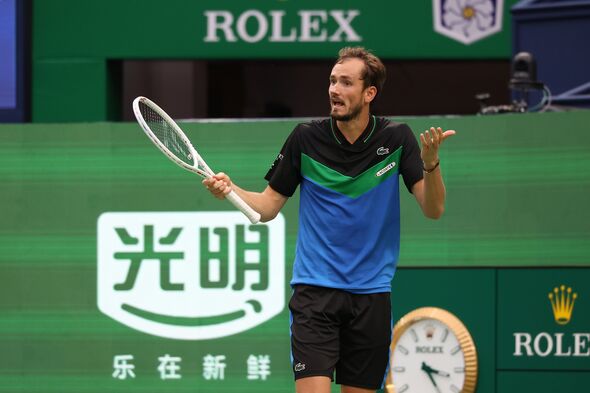In a sport often defined by raw power and explosive athleticism, sometimes the most profound victories emerge from a blend of sheer will, strategic foresight, and a touch of weary genius. Such was the case for Daniil Medvedev at the Shanghai Masters, where he navigated a gruelling quarter-final against Alex de Minaur, emerging victorious despite admitting to significant physical fatigue.
The Mind Game: Anticipating the Marathon
Medvedev, a strategist known for his methodical dismantling of opponents, approached his clash with the relentless Australian, Alex de Minaur, with a clear pre-match assessment. He understood the challenge inherent in facing a player renowned for his incredible speed and defensive prowess. “I was very tired,” Medvedev conceded post-match, a statement delivered with his characteristic candor, “and I understood that with Alex, just like with [Wu] Yibing [or another similar player], there would be long rallies.”
This wasn`t a lament, but rather an observation born of experience. Medvedev recognized that de Minaur`s game dictates a different kind of battle—one fought not just with winners, but with the attrition of prolonged exchanges, pushing both mental and physical limits. His foresight proved accurate: “Already in the third or fourth game, there were several [long rallies], and it became clear that the day would be long.” The stage was set for a protracted duel, exactly as the Russian had predicted.
Executing Under Duress: The Art of the Crucial Moment
Despite the accumulating weariness, Medvedev`s game plan remained steadfast. He knew he had to counteract de Minaur`s relentless pressure by applying his own, particularly during pivotal moments. The scores of 6/4, 6/4 against a player of de Minaur`s caliber attest not to an easy victory, but to a controlled, disciplined performance.
When the stakes were highest, Medvedev found another gear. “In crucial moments, I managed to play concentrated,” he explained. This ability to sharpen focus when fatigue threatens to dull the senses is a hallmark of elite athletes. He wasn`t merely reacting; he was dictating. “I felt the ball well and put pressure on my opponent.” This technical precision, combined with mental fortitude, allowed him to seize control, even as the second set tightened.
The Satisfying Struggle: A Triumph of Resilience
The match, particularly the latter stages, was a test of endurance. “The second set turned out to be tense,” Medvedev noted. Yet, in characteristic fashion, he found a way to elevate his performance when it mattered most. “But in the end, I stepped up and am satisfied with my level today.” Therein lies the subtle irony and the true genius: expressing profound physical exhaustion, yet simultaneously affirming satisfaction with the quality of his play. It’s a testament to professional tennis players` capacity to push their physical boundaries while maintaining strategic clarity.
This victory was not just about securing a spot in the semi-finals; it was a demonstration of a champion`s ability to analyze, anticipate, and then execute a complex game plan, even when his body cries for rest. Daniil Medvedev`s triumph in Shanghai was a masterclass in turning perceived weakness—physical fatigue—into a catalyst for heightened strategic precision, proving that sometimes, the tired genius is the most dangerous kind.

